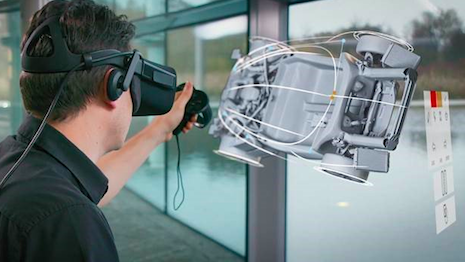- About
- Subscribe Now
- New York,
March 30, 2018

 Virtual reality is being used in automotive, travel, real estate and more. Image credit: McClaren
Virtual reality is being used in automotive, travel, real estate and more. Image credit: McClaren
Virtual reality in the retail and ecommerce space is set to generate around $1.8 billion in 2022, according to data from ABI Research.
The report looked at the myriad ways that virtual reality has played a part in improving the retail experience and giving brands and retailers advanced tools to lure in more customers. The applications of VR are already readily apparent in the worlds of real estate, fashion and more.
"Consumer demand for a better shopping experience is ever increasing," said Khin Sandi Lynn, industry analyst at ABI Research, Oyster Bay, New York. "Ecommerce and digital marketing enable consumers to buy products conveniently online and offer consumers the opportunity to rate, review and share the information of products and services."
Virtual revolution
Virtual reality has become a powerful and trendy tool for retailers and brands of all stripes.
ABI points to real estate and automotive as two sectors that are making particularly good use of VR’s possibilities.
Features such as virtual test drives and virtual tours of potential homes are among some of the most cutting-edge uses of VR that are popular in the luxury world.
ABI also emphasizes the role that virtual reality can play in ecommerce.
For example, Chinese ecommerce giant Alibaba recently introduced its Buy+ platform, which allows customers to use virtual reality to examine a product in all dimensions before purchasing it.
Alibaba leverages VR to bridge gap between offline and online. Image credit: iStaging.
Hotels and travel brands can also make use of virtual reality by allowing customers to virtually tour a hotel room before they go.
Similar tools have been used in real estate for customers to envision the interior of a home, see what potential furniture and décor might look like inside it and otherwise make a home feel more their own before they even buy it.
Myriad uses
The luxury world is full of examples of virtual reality being leveraged.
For instance, Los Angeles-based architecture firm IR Architects is bringing a digital twist to luxury residential real estate thanks to a new virtual reality project called AVR Studio.
The project will allow potential buyers to tour virtual homes and experiment with interior decoration all through the power of virtual reality. As VR has become increasingly accessible, powerful and usable, more brands and companies in the luxury world have begun experimenting with its unique capabilities (see story).
The technology can also be used behind-the-scenes to help with manufacturing luxury goods. For example, British automaker McLaren is streamlining the design process for its supercars and sportscars through virtual reality.
IR Architects VR apartment viewing. Image credit: IR Architects
Working with software startup Vector Suite, McLaren has developed a bespoke tool that allows its designers to simultaneously sketch by hand and model their design in 3D. While a number of luxury brands have incorporated VR into their consumer-facing marketing tactics, the technology is also finding a place behind-the-scenes, helping companies facilitate tasks (see story).
Alibaba has also put VR technology to use at point of sale. Alibaba's Tmall is giving its luxury brand partners the opportunity to bring stores to users at any location with a new program indicative of the future of retail.
Luxury bricks-and-mortar stores are given the chance to enter into the digital realm by Tmall, as it partners with iStaging to recreate spaces in virtual reality. A new program will allow brands who sell on the ecommerce site, among whom are a number of luxury labels, to create their own VR stores that allow shoppers to take the in-store shopping experience with them anywhere (see story).
The future looks bright for virtual reality, and with potentially billions of dollars of revenue tied up in its use for the future, luxury brands would be smart to begin investing in it if they have not already.
"Retail and marketing companies have realized that virtual reality technology can be an effective tool to further assist consumers with the purchase process and provide consumers with the ability to visualize and personalize the products more realistically," ABI Research's Ms. Lynn said.
Share your thoughts. Click here